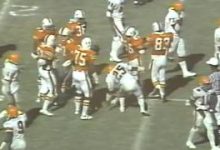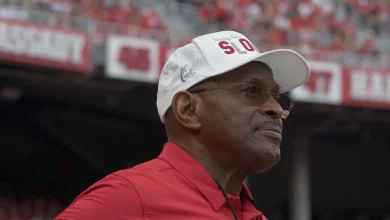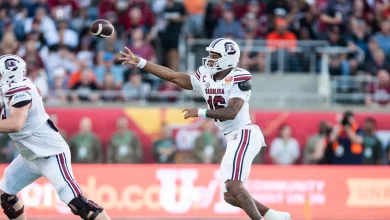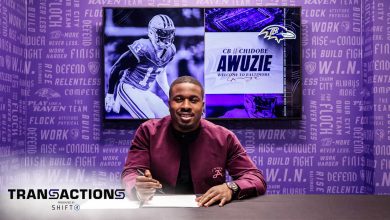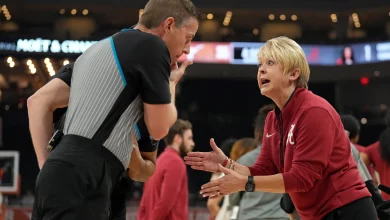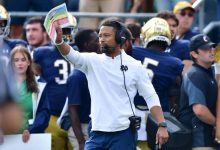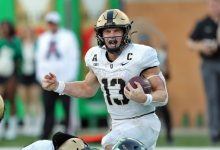It’s Going To Start and End There’ — Mario Cristobal Reveals the 1 Position That Defines Miami Football
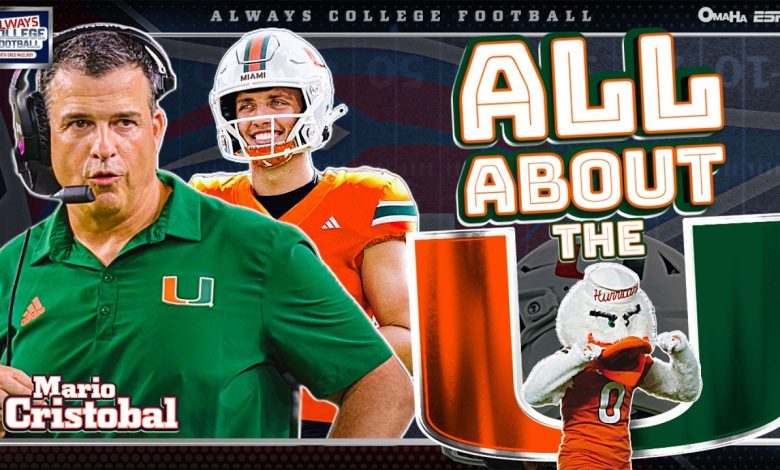
In the high-stakes world of college football, programs are often defined by their identity — a core philosophy or position group that embodies the team’s spirit, strategy, and competitive edge. For the University of Miami Hurricanes, a school steeped in rich football tradition and championship pedigree, the defining element of their resurgence under head coach Mario Cristobal has become crystal clear. “It’s going to start and end there,” Cristobal emphasized recently, revealing the one position that, more than any other, defines Miami football.
The Weight of Tradition at Miami
Miami football carries an aura unlike many programs in the country. The Hurricanes have produced legends — from Michael Irvin to Ray Lewis, Ed Reed to Warren Sapp — players who weren’t just great athletes but defining figures at their respective positions. This legacy is a double-edged sword for a program in transition: the burden to live up to past glory while forging a new identity in an ever-changing college football landscape.
Mario Cristobal, known for his fiery passion and strategic acumen, arrived at Miami with a clear mission — to rebuild the Hurricanes into a national contender. His vision was not just about recruiting talent but cultivating a culture rooted in toughness, discipline, and a dominant style of play. And as the Hurricanes began assembling their roster and installing their schemes, one truth became undeniable: the program’s identity hinged on the offensive line.
Offensive Line: The Heart of Miami’s Identity
“It’s going to start and end there,” Cristobal said, pointing directly to the offensive line when asked what defines Miami football today. To many, the offensive line is an unsung unit, a group of players who toil in the trenches without the glamour of skill positions. But to Cristobal, and to the Hurricanes’ future, the O-line is the foundation.
Cristobal’s own coaching background offers insight into why the offensive line holds such a place of importance. Before becoming a head coach, Cristobal was renowned for his work with the offensive line at programs like Oregon and Alabama. His philosophy emphasizes physical dominance at the line of scrimmage — controlling the game’s tempo through power running and protecting the quarterback with impenetrable pass blocking.
At Miami, this philosophy aligns perfectly with the team’s goals. In a conference loaded with speed and skill, the Hurricanes seek to establish a physical identity that can set the tone early in games. “If you can’t win the battle up front, you’re fighting an uphill battle every play,” Cristobal explained. “Our offense, our defense, our special teams — everything starts with that line.”
The Tactical Importance of the Offensive Line
From a tactical standpoint, the offensive line is the catalyst for both the run game and the passing attack. In Cristobal’s system, the offensive line’s ability to execute complex blocking schemes—whether it’s zone blocking, power schemes, or pulling guards—is crucial. Their proficiency allows the Hurricanes’ skill players to thrive.
Miami’s offense depends heavily on establishing the run early to set up play-action passes. A dominant offensive line not only opens holes for running backs but also buys quarterbacks time in the pocket. This dual-threat capability keeps defenses guessing and helps Miami maintain offensive balance.
Cristobal has emphasized that the offensive line’s discipline and technique reduce negative plays—such as sacks, tackles for loss, and penalties—that can derail drives. “A lot of people overlook how an offensive line can control a game,” Cristobal noted. “But when you have a unit that works in unison, with precision and power, you control the clock, the field position, and ultimately the scoreboard.”
Recruiting the Right Talent: Building the Line of Future
Identifying the offensive line as the cornerstone of Miami football is one thing; assembling a top-tier group is another challenge altogether. Cristobal and his staff have poured tremendous effort into recruiting offensive linemen who fit the program’s physical and mental profile.
Miami’s rich talent pool in South Florida gives the Hurricanes an advantage in recruiting high-caliber linemen. However, competing with national powerhouses for elite prospects means Miami must not only attract talent but develop it at a rapid pace. Cristobal’s track record of developing offensive line talent — transforming promising recruits into NFL-ready players — has been a significant draw.
The coaching staff prioritizes traits like size, athleticism, intelligence, and relentless work ethic. Miami offensive linemen must be physically imposing yet agile, capable of handling speed rushers and powerful bull rushes alike. Mental toughness and adaptability are equally important, given the complexity of Cristobal’s schemes.
Several recent signees and transfers have already shown promise, blending size and technique. They represent the future of the Hurricanes — a future where the offensive line doesn’t just protect but defines the team’s competitive identity.
The Ripple Effect: Defense and Team Morale
The offensive line’s impact extends beyond just offensive production. A strong offensive line positively influences the defense and overall team morale. By sustaining long drives and controlling the clock, the offense keeps the defense rested and opponents off the field. This complementary football is essential in the grueling ACC schedule.
Cristobal noted that when the offensive line is dominant, the entire team feeds off that energy. “The guys in the trenches don’t get the spotlight, but they’re the ones who set the tone in the locker room and on the field,” he said. “Their work ethic, toughness, and grit inspire everyone else.”
For Miami, where pride and resilience have always been cultural hallmarks, the offensive line embodies those ideals. It’s a unit where individual effort melds into collective strength — a microcosm of what Miami football aspires to be.
Early Returns and Looking Ahead
The 2025 season serves as a proving ground for Cristobal’s offensive line vision. Early in the year, Miami has shown flashes of physical dominance and cohesion up front. The offensive line’s ability to open running lanes and protect the quarterback has been a key factor in the team’s offensive efficiency.
However, challenges remain. Injuries, depth concerns, and the learning curve for younger players mean that consistency will be tested. Cristobal remains optimistic but grounded: “This is a process. We’re building something special, and it starts with this group.”
Looking ahead, Miami’s identity will continue to revolve around the offensive line. Success in recruiting, development, and execution in this position group will set the trajectory for the program’s return to national prominence.
When Mario Cristobal says, “It’s going to start and end there,” he’s not just highlighting a position — he’s encapsulating the essence of Miami football’s rebirth. The offensive line represents tradition and innovation, toughness and skill, individuality and teamwork.
For fans, players, and the broader college football community, the story of Miami football in the Cristobal era is inextricably tied to the trenches. As the Hurricanes forge their path forward, the offensive line stands as the unyielding heart of the team — the defining element that will determine whether Miami can recapture its place among college football’s elite.
In the end, the line isn’t just where games are won or lost; it’s where Miami football’s soul is forged.


